


Two massive quakes that struck southern Turkiye on Feb 6 have claimed over 42,000 lives, acording to Turkiye's Disaster and Emergency Management Authority.
On Feb 20, two new earthquakes measuring 6.4- and 5.8-magnitude, respectively, jolted the southern Hatay province near the Syrian border, killing at least six people and wounding 294 others.
DAMASCUS -- A total of 275 shelters have been opened across Syria, hosting victims of the earthquake that hit the country on Feb. 6, the ministry of local administration and environment said Sunday.
In a short statement, the ministry said 235 shelters were opened in the northern Aleppo province, 32 in the northwestern province of Latakia, five in Hama province, and two in Tartous province.
The statement spelled no details about the situation in the rebel-held areas in Idlib province and the northern countryside of Aleppo.
According to the Syrian Health ministry, the death toll has risen to 1,414 and the wounded to 2,349 as of Sunday evening. The UN said on Friday that the earthquake in Syria had displaced 5.3 million people.
Meanwhile, the Syrian Observatory for Human Rights war monitor said the death toll could be more than 5,300 in Syria, and the number could rise to as many as 7,000 as many people are still buried under the rubble.

ANKARA/DAMASCUS — International rescuers are racing against time searching for signs of life among the wreckage in quake-stricken regions, as the essential 72-hour window has closed. But sanctions by the United States on Syria have obstructed coordinated efforts to save lives in the country, triggering worldwide criticism.
Turkiye's President Recep Tayyip Erdogan said his country is facing "one of the biggest disasters" of its modern history.
In Syria, where the economic situation is even worse than that of Turkiye, most quake-hit cities are still waiting for international aid, especially excavation equipment and medical supplies. Rescuers in Aleppo have to dig through the rubble with their bare hands due to a lack of rescue equipment.
People are railing against the US for retaining economic sanctions when Syria desperately needs help.
Salem Abu Al-Oyoun, a displaced Syrian who moved from Aleppo to Al-Wazani camp in southeastern Lebanon, said the decision of the US Treasury to temporarily ease sanctions is a big lie that does not serve the people who have suffered from the unjust US siege.
"The United States knows that the sanctions imposed on the Syrian people were unjust and led to worsening the living conditions of the Syrians over the past few years," said Kamal al-Jafa, a political expert.
Countries including China and the public are urging the US to lift its sanctions and blockade on Syria to allow much-needed aid to reach the disaster zone as soon as possible.
"Western countries don't need to send anything. Just remove lethal sanctions on Syria," Sharmine Narwani, a commentator and analyst of Middle East geopolitics, tweeted.
By maintaining the airspace's closure and blocking the entry of any medical or relief equipment to the area, the US' sanctions have prevented any effort to help the affected area's residents, said Mazen Shamieh, former assistant minister for the Palestinian Foreign Ministry.
The Chinese Foreign Ministry on Wednesday demanded an immediate lifting of US sanctions on Syria as the country is facing a serious humanitarian crisis.
"Even today, US troops still occupy Syria's principal oil fields, plunder more than 80 percent of the country's oil production, and have smuggled and burned Syria's grain stock, exacerbating the humanitarian crisis there," said Mao Ning, spokeswoman for the Chinese Foreign Ministry.
"In the wake of the devastating earthquakes, the US should let go of its geopolitical obsession, immediately lift unilateral sanctions on Syria and open the door for humanitarian aid."
XINHUA

China's official and civilian rescue teams worked against the clock over the weekend to find survivors trapped under rubble, following the Feb 6 earthquakes in Turkiye and Syria.
By Sunday, the official rescue team from the Chinese mainland had saved five people and located eight bodies while surveying 49 collapsed buildings in Antakya, one of the worst-hit cities in Turkiye's southern Hatay province.
In a three-hour rescue operation on Friday, a woman was pulled to safety from ruins by the official team, more than 100 hours after the first quake, a magnitude 7.8 temblor, hit. About nine hours later, a second, magnitude 7.5, quake struck the region.
The team was called to the site after their Turkish counterparts discovered signs of life while clearing a pile of rubble. During the operation, the Chinese rescuers squeezed a flexible endoscope camera through small gaps in the debris to survey the conditions beneath. They also worked with Turkish rescuers to break up the surface of rubble to gain access to the woman and extract her safely.
On Saturday evening, with technical support from the Chinese team, Turkish rescuers successfully saved a man during a joint search mission in Antakya where survivors were found the previous day.
The 82-member official Chinese team has been working closely with its international counterparts from Italy, the United Kingdom, Serbia, Slovakia and Oman, ensuring that search and rescue missions are well coordinated.
Meanwhile, a 59-member team sent by the Hong Kong government pulled three survivors from six-meter-deep rubble in Hatay on Saturday.
Yiu Men-yeung, head of the HK team, said that it was exciting to find the survivors six days after the earthquake. Rescuers will do their best to search for more people and won't give up hope, Yiu added.
China's civilian rescue teams also continued to search for survivors over the weekend. As of Friday morning, 15 civilian Chinese rescue teams, comprising 288 members, had made it to quake-hit regions in Turkiye.
On Saturday, the Rescue Team of Ramunion helped locate seven people trapped in an apartment building in Iskenderun, Hatay, after 10 hours of searching. Unfortunately, they were all dead, the team's command center said.
The Ramunion team has been involved in search and rescue missions in four cities in Hatay since arriving in Turkiye on Wednesday. By Saturday night, the team had found seven survivors.
Meanwhile, China also delivered on Saturday morning its first earthquake relief supplies to Turkiye, including tents and medical equipment, according to the China International Development Cooperation Agency.
The death toll in Turkiye and Syria surpassed 33,000 on Sunday, AP reported.
Zhao Mi, a Chinese national who has lived in Antakya since 2019, survived the earthquake. While receiving treatment at a hospital, she recalled the terrifying moment the quake struck early in the morning.
She and her children were sleeping in separate bedrooms when the 15-story apartment building they had been living in collapsed on Monday, Chinese media reported on Saturday.
"The building first started to shake violently. When it collapsed, I immediately curled up my body. I was buried in darkness and couldn't move," the 32-year-old said.
She could hear her daughter, 9, and son, 13, calling for help and they were soon rescued from the rubble.
Zhao was pulled from the ruins about 25 hours after the building collapsed. "I used toilet tissue to soak up rainwater dripping down from the rubble and then squeezed the water into my mouth to survive. The water also kept me alert so I could call for help," she said.
Zhao was being treated for multiple fractures in a hospital. Her daughter was in the intensive care unit of another hospital for multiple fractures and injuries to her organs.
Members of China's official rescue team dispatched to Turkiye, together with local rescuers, pulled a survivor out of ruins of a flattened building in Antakya, Turkiye at 3:30 pm local time on Sunday, increasing the number of survivors they have helped save to five.

ISTANBUL - The first batch of emergency aid delivered by the Chinese government for earthquake relief has landed at Istanbul Airport on Saturday. The supplies, including tents and blankets, will then be transported to quake-hit areas by another large cargo plane from Istanbul. In the coming days, other emergency supplies, including tents, electrocardiographs, ultrasonic diagnostic equipment and medical transfer vehicles will be shipped in batches from China.
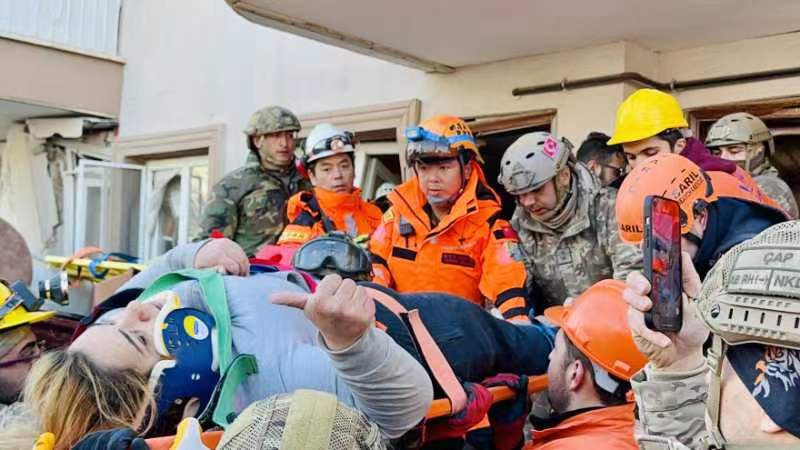
BEIJING -- International search and rescue teams have rushed to Turkiye to assist in rescue efforts after two massive earthquakes jolted the country Monday. Chinese rescuers have successfully saved four survivors so far.
An 82-member China Search and Rescue Team arrived in Turkiye on Wednesday to join earthquake relief efforts in the country. Members of the Blue Sky Rescue Team and other Chinese civil relief squads were also in Turkiye to join the international rescue work. On Friday, following a three-hour effort, a woman, the fourth survivor saved by Chinese rescuers, was pulled out to safety from the rubble of collapsed buildings over 96 hours after the earthquake.
The death toll from Monday's devastating earthquakes climbed to 20,213 in Turkiye, while another 80,052 injuries were reported in the country, Turkish Health Minister Fahrettin Koca announced late Friday.
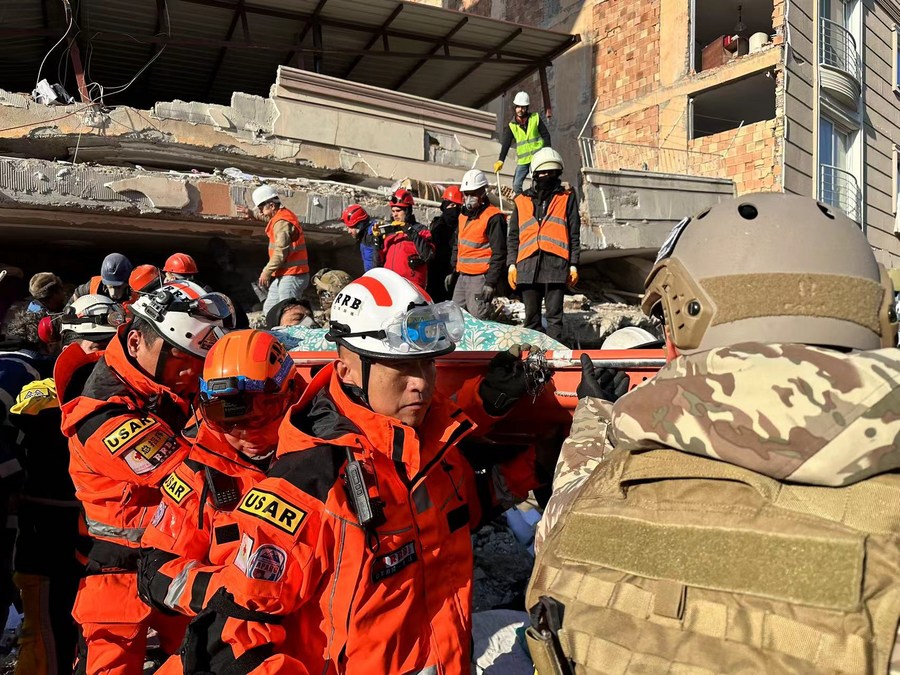
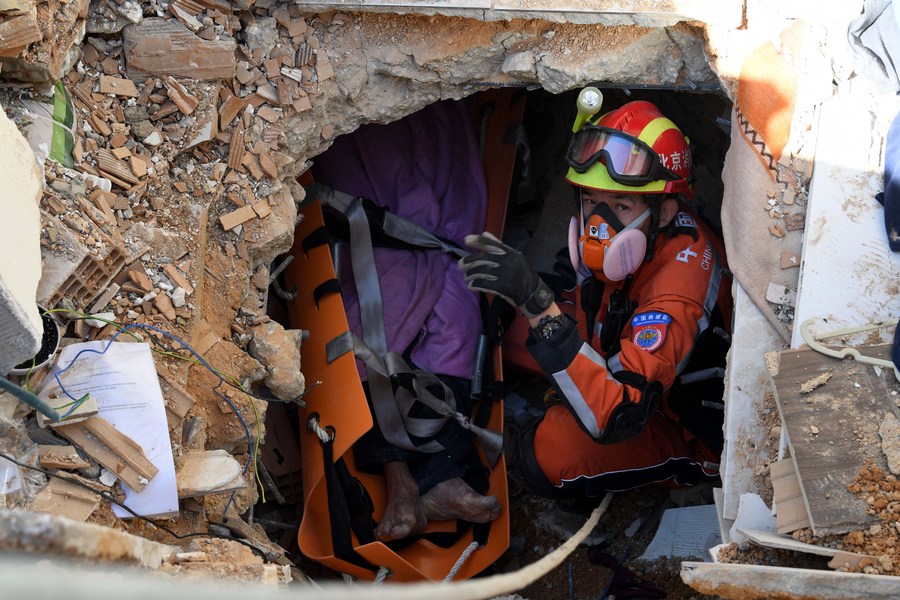
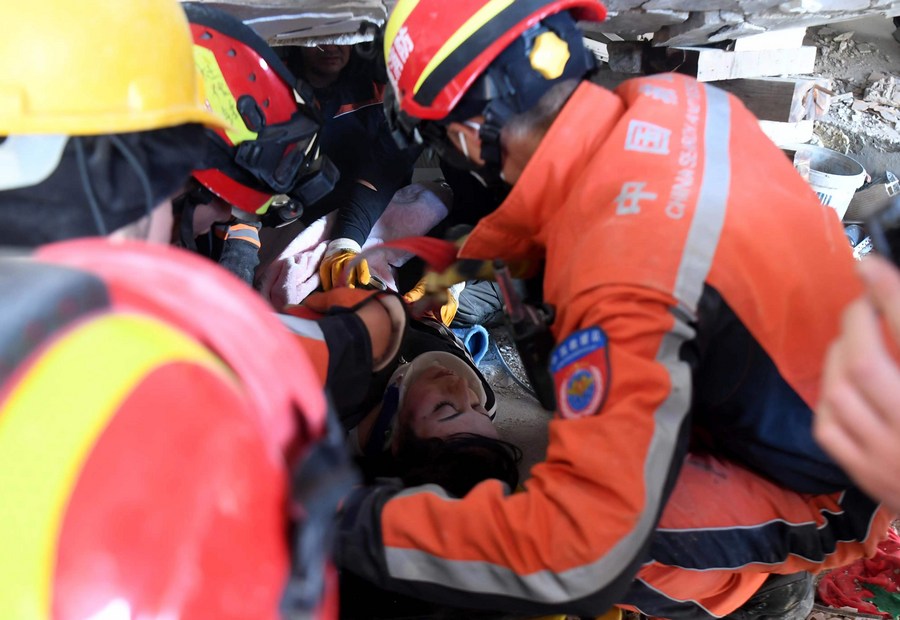

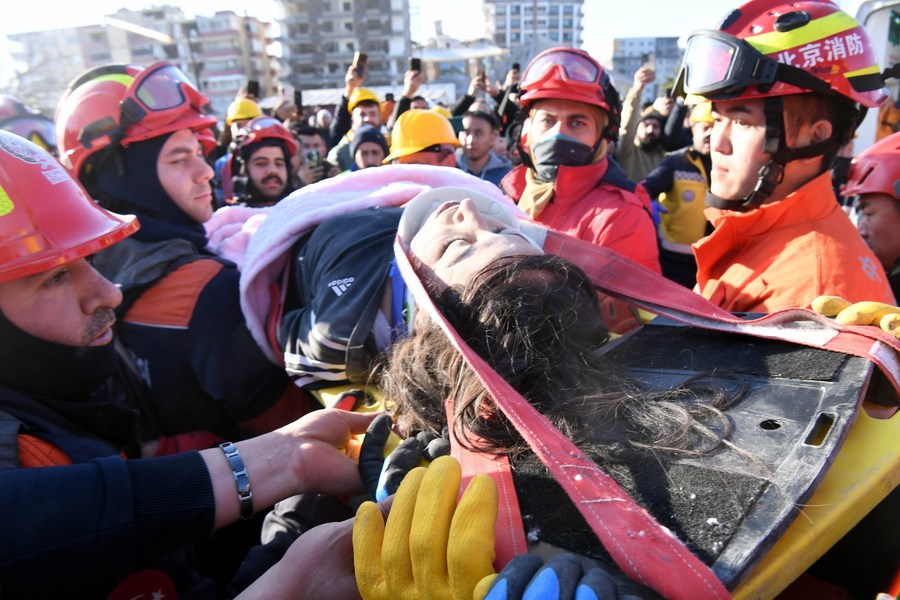
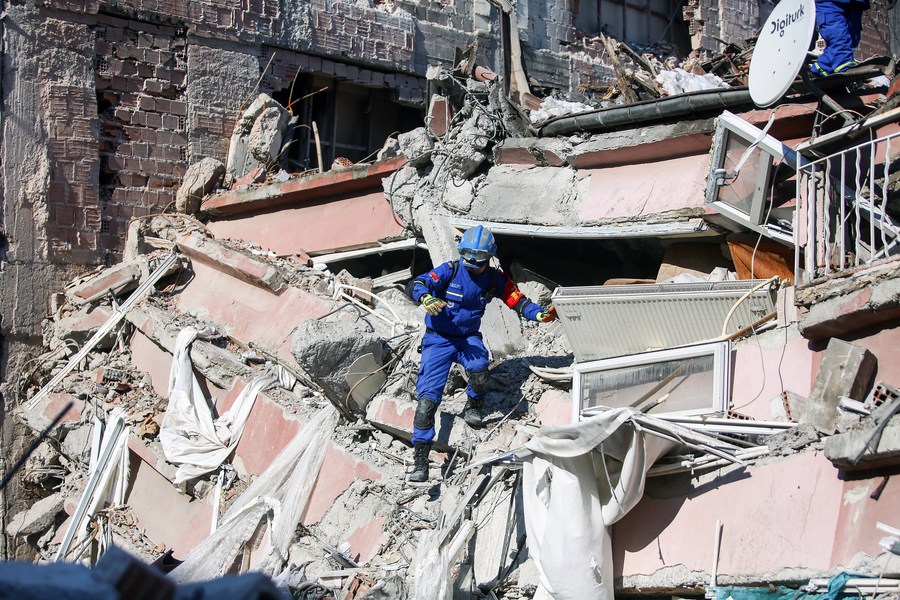

LATAKIA, Syria — Ibrahim Zakaria lost track of time drifting into and out of consciousness while trapped for nearly five days in the rubble of his home following the massive earthquake that struck Turkiye and Syria this week.
The 23-year-old cellphone shop worker from the Syrian town of Jableh survived on dirty drips of water and eventually lost hope that he'd be saved.
"I said I am dead and it will be impossible for me to live again," Zakaria, who was rescued Friday night, told The Associated Press on Saturday from his bed at a hospital in the coastal city of Latakia where his 60-year-old mother, Duha Nurallah, was also recovering.
Five days after two powerful earthquakes hours apart caused thousands of buildings to collapse, killing more than 28,000 people and leaving millions homeless, rescuers were still pulling unlikely survivors from the ruins — one of them just 7 months old.
Although each rescue elicited hugs and shouts of "Allahu akbar!" — "God is great!" — from the weary men and women working tirelessly in the freezing temperatures to save lives, they were the exception in a region blanketed by grief, desperation and mounting frustration.
More than a dozen survivors were rescued Saturday, including a family in Kahramanmaras, the Turkish city closest to the epicenter of Monday's quake. Crews there helped 12-year-old Nehir Naz Narli to safety before going back for her parents.
In Gaziantep province, which borders Syria, a family of five was rescued from a demolished building in the city of Nurdagi, and a man and his 3-year-old daughter were pulled from debris in the town of Islahiye, television network HaberTurk reported. A 7-year-old girl was also rescued in Hatay province.
In Elbistan, a district in Kahramanmaras province, 20-year-old Melisa Ulku and another person were saved from the rubble 132 hours after the quake struck. Before she was brought to safety, police asked onlookers not to cheer or clap so as not to interfere with nearby rescue efforts.
Turkish TV station NTV reported that a 44-year-old man in Iskenderun, in Hatay province, was rescued 138 hours into his ordeal. Crying rescuers called it a miracle, with one saying they weren't expecting to find anyone alive but as they were digging, they saw his eyes and he said his name. In the same province, NTV also reported that a baby boy named Hamza was found alive in Antakya 140 hours after the quake. Some details of his rescue, including how he survived so long, weren't immediately clear.
Not every attempt ended happily. Zeynep Kahraman, who was brought out of the rubble after a spectacular rescue that took 50 hours, died at a hospital overnight. The ISAR German team who rescued her were shocked and saddened.
"It is important that the family could say goodbye, that they could see each other one more time, that they could hug each other again," a member of the rescue team told German TV news channel n-tv.
The rescues came amid growing frustration over the Turkish government's response to the earthquake, which has killed 24,617 people and injured at least 80,000 people in Turkiye alone.
Turkish President Recep Tayyip Erdogan acknowledged earlier in the week that the initial response was hampered by the extensive damage to roads and other infrastructure that made it difficult to reach some points. He also said the worst-affected area was 500 kilometers (310 miles) in diameter and was home to 13.5 million people in Turkiye.
That has meant rescue crews have had to pick and choose how and where to help.
During a tour of quake-damaged cities Saturday, Erdogan said a disaster of this scope was rare and again referred to it as the "disaster of the century." But the challenges facing aid efforts were of little comfort to those waiting for help.
In Antakya, the capital of Hatay province, scattered rescue crews were still hard at work but many residents had left by Saturday. Among those who stayed were people with family still buried. Many of them had been camping in the streets for days and sleeping in cars.
Acting on a tip, a rescue team from Hong Kong found three survivors under a building near the city's center on Saturday, said Gallant Wong, the group's spokesperson.
But Bulent Cifcifli, a local man, said he has been waiting for days for crews to pull his mother's body from her collapsed home. He said rescuers were working to retrieve her body at one point, but they were called to another location because they suspected there were survivors.
"Six days later, we don't know how many are still under the rubble, and how many are dead or alive," Cifcifli said, blaming a lack of heavy equipment.
Yazi al-Ali, a Syrian refugee who came to Antakya from Reyhanli, has been living in a tent as she waits for crews to find her mother, two sisters, including one who was pregnant, and their families. At one point, she stood over the rubble of the home in Antakya's old city center where she believes her pregnant sister was buried and, in a cracking voice, shouted her sister's name, "Rajha!" "No one is answering to us, and no one comes to look," she said. "They have stopped us from looking ourselves. I don't know why." Even though experts say trapped people can live for a week or more, the odds of finding additional survivors are quickly waning. Rescuers were shifting to thermal cameras to help identify life amid the rubble, a sign that any remaining survivors could be too weak to call for help.
As aid continued to arrive Saturday, a 99-member group from the Indian Army's medical assistance team began treating the injured in a temporary field hospital in the southern city of Iskenderun, where a main hospital was demolished.
One man, Sukru Canbulat, was wheeled into the hospital, his left leg badly injured with deep bruising, contusions and lacerations.
Wincing in pain, he said he was rescued from his collapsed apartment building in nearby Antakya within hours of the quake. But after receiving basic first aid, he was released without getting proper treatment.
"I buried (everyone that I lost), then I came here," Canbulat said, counting his dead relatives. "My daughter is dead, my sibling died, my aunt and her daughter died, and the wife of her son" who was 8? months pregnant.
A large makeshift graveyard was under construction in Antakya's outskirts on Saturday. Backhoes and bulldozers dug pits in the field as trucks and ambulances loaded with black body bags arrived continuously. Soldiers directing traffic on the busy adjacent road warned motorists not to take photos.
The hundreds of graves, spaced no more than 3 feet (a meter) apart, were marked with simple wooden planks set vertically in the ground.
A worker with Turkiye's Ministry of Religious Affairs who didn't wish to be identified because of orders not to share information with the media said that around 800 bodies were brought to the cemetery Friday, its first day of operation. By midday Saturday, he said, as many as 2,000 had been buried.
The disaster compounded suffering in a region beset by Syria's 12-year civil war, which has displaced millions of people within the country and left them dependent on aid. The fighting sent millions more to seek refuge in Turkiye.
The conflict has isolated many areas of Syria and complicated efforts to get aid in. The United Nations said the first earthquake-related aid convoy crossed from Turkiye into northwestern Syria on Friday, the day after an aid shipment planned before the disaster arrived. The U.N. refugee agency estimated that as many as 5.3 million people have been left homeless in Syria alone.
The death toll in Syria's northwestern rebel-held region has reached 2,166, according to the rescue worker group the White Helmets. The overall death toll in Syria stood at 3,553 on Saturday, though the 1,387 deaths reported for government-held parts of the country hadn't been updated in days.
AP
ANKARA -- A border gate between Turkiye and Armenia has been opened for the first time in 30 years for the passage of humanitarian assistance for victims of the devastating earthquakes hitting southern Turkiye, the state-run Anadolu News Agency reported Saturday.
An Armenian delegation with five trucks of aid has entered Turkiye through the Alican Border Gate in the eastern province of Igdir, the report said.
The Armenian aid delegation carrying 100 tonnes of food, medicine, and drinking water passed through the gate in the morning toward the southeastern province of Adiyaman, according to a tweet on Saturday by Serdar Kilic, Turkiye's special representative for normalization talks with Armenia.
On Tuesday, Armenian Prime Minister Nikol Pashinyan offered condolences and support to the Turkish people in a phone conversation with Turkish President Recep Tayyip Erdogan.
Armenia has sent 27 rescuers to quake-hit Turkiye to assist in the search-and-rescue operations, the country's internal affairs ministry said Wednesday.
The Alican Border Gate was last used in the 1988 earthquake in Armenia when the Turkish Red Crescent crossed the border gate to dispatch aid to disaster areas.
Turkiye severed diplomatic relations and closed the border with Armenia in 1993 in support of Azerbaijan which was fighting a war with Armenia over the disputed region of Nagorno-Karabakh, before the two neighbors launched talks for the re-normalization of relations in 2022.
On Monday, two devastating earthquakes measuring 7.7- and 7.6-magnitude hit 10 provinces in southern Turkiye, killing at least 21,848 so far and injuring over 80,000, according to the latest figures.
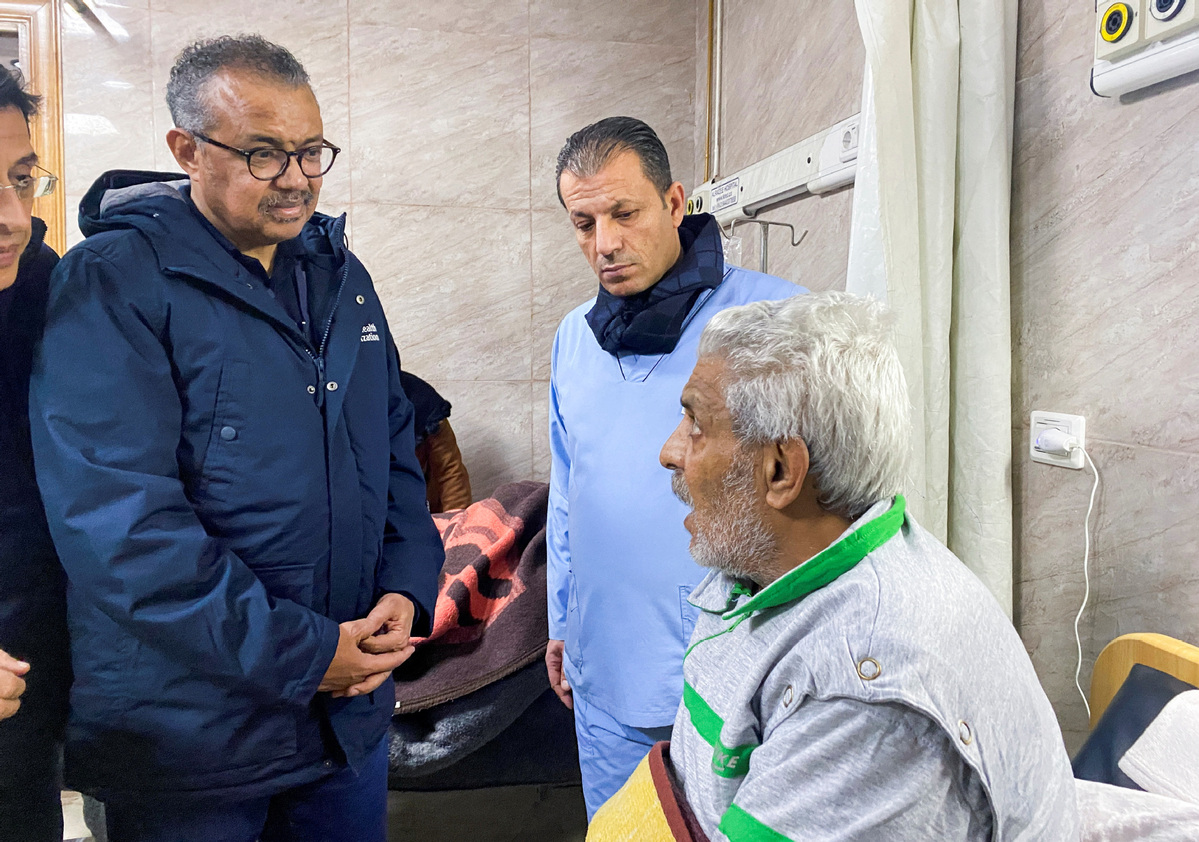
ALEPPO, Syria -- WHO Director-General Tedros Adhanom Ghebreyesus visited the quake-hit Aleppo city in northern Syria on Saturday, raising hope for more emergency aid to reach Syria in the coming days.
The World Health Organization brought 35 tons of relief aid to Aleppo on Saturday as Ghebreyesus reached the city and visited some hospitalized people, shelters where displaced people are staying, and damaged areas.
His visit comes in the wake of the deadly earthquake that rocked Syria on Monday, killing 5,000 people in government and rebel-held areas.
Speaking to reporters during his tour, Ghebreyesus said that easing the U.S. sanctions on Syria within the next 180 days would give a window to bring more emergency supplies and support.
According to a UNHCR estimation, 5.3 million people in Syria might have been left homeless by the earthquake.

ANTAKYA, Turkiye — The death toll in Turkiye and Syria from the earthquake that struck five days ago has surpassed 25,000.
Turkiye's president Recep Tayyip Erdogan on Saturday raised the death toll in his country to 21,848, while in Syria, the reported number of dead was 3,553.
Some 80,104 people have been injured in Turkiye alone, Erdogan said, speaking in the city of Sanliurfa. A few survivors are still being pulled from the rubble, however, more than 130 hours after the quake.
Rescue teams in Turkiye on Saturday pulled to safety a family of five who survived inside their collapsed home for five days.
They first extricated mother and daughter Havva and Fatmagul Aslan from among a mound of debris in the hard-hit town of Nurdagi, in Gaziantep province, HaberTurk reported. The teams later reached the father, Hasan Aslan, but he insisted that his other daughter, Zeynep, and son Saltik Bugra be saved first.
Then, as the father was brought out, rescuers cheered and chanted "God is Great!" Two hours later, a 3-year-old girl and her father were pulled from debris in the town of Islahiye, also in Gaziantep province, and an hour after that a 7-year-old girl was rescued in the province of Hatay, nearly 132 hours after the quake. The rescues bring to 12 the number of people rescued Saturday, despite diminishing hopes amid freezing temperatures.
"What day is it?" 16-year-old Kamil Can Agas asked his rescuers after he was pulled out of the rubble in Kahramanmaras, according to NTV television.
Members of the mixed Turkish and Kyrgyz search teams embraced each other, as did the teenager's cousins, with one of them calling out: "He is out, brother. He is out. He is here."
The rescues brought shimmers of joy amid overwhelming devastation. Not everything ended so well, however. Rescuers reached a 13-year-old girl inside the debris of a collapsed building in Hatay province early on Saturday and intubated her. But she died before the medical teams could amputate a limb and free her from the rubble, Hurriyet newspaper reported.
Even though experts say trapped people can live for a week or more, the odds of finding more survivors were quickly waning. Rescuers were shifting to thermal cameras to help identify life amid the rubble, a sign of the weakness of any remaining survivors.
AP
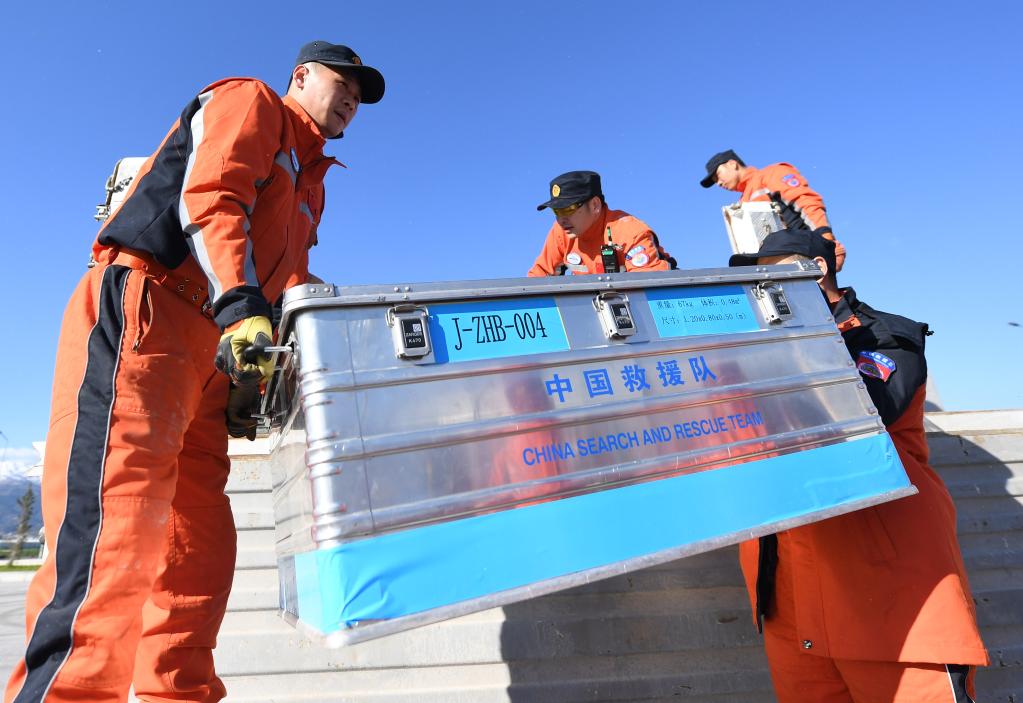
The Chinese have paid great attention to the earthquake in Turkiye.
I was at the Turkish Consulate General in Shanghai today. Chinese people have been calling the contact numbers of the Turkish Consulate General in Shanghai all day long.
We set up an extra team of Turkish students to catch up. As the Turkish Students Association, we have established a call center that works with the Turkish Consulate General in Shanghai and a group to organize items accumulated in the warehouse. We were very touched by the Chinese attention to the earthquake in Turkey.
In addition, we established a coordination team with the Chinese Embassy in Ankara to find Turkish translators for the Chinese search and rescue teams there.
The biggest problem we face in China is we have many Chinese friends who want to donate. But unfortunately, there are various US embargoes and problems in transferring money from China to Turkiye . Apart from that, we help send materials such as generators, heaters, medical supplies, winter clothes, coats and shoes through Turkish Airlines. In various cities of China, Muslims collected donations during Friday prayers.
The author is a journalist at Ayd?nl?k Newspaper.
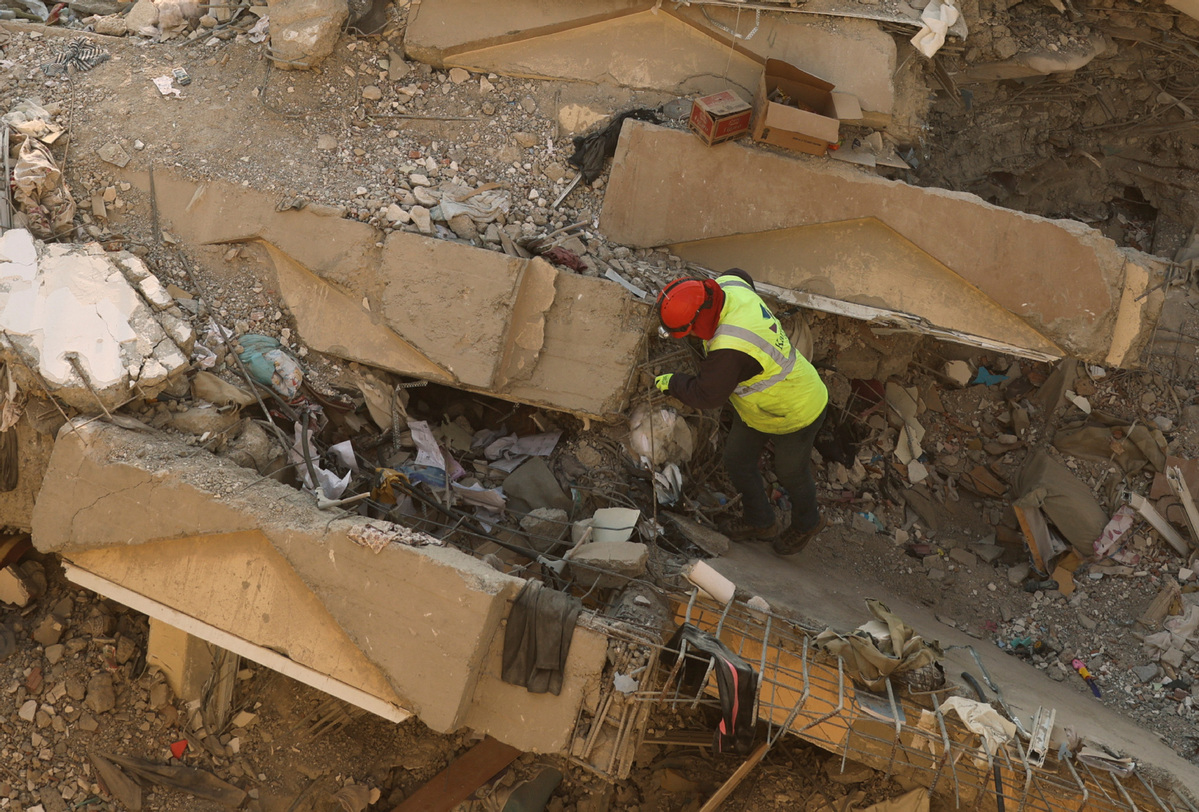
ANTAKYA, Turkiye/JANDARIS, Syria - Rescuers in Turkiye pulled two women alive from the rubble of collapsed buildings after they were been trapped for 122 hours following the region's deadliest quake in two decades, authorities said on Saturday.
The death toll exceeded 24,150 across southern Turkiye and northwest Syria a day after Turkish President Tayyip Erdogan said authorities should have reacted faster to Monday's huge earthquake.
One of the rescued women, Menekse Tabak, 70, was swaddled in a blanket while rescuers carried her to a waiting ambulance in the province of Kahramanmaras, images from state news agency Anadolu showed.
The other was an injured 55-year-old, identified as Masallah Cicek, who was extricated from the debris of a collapsed building in Diyarbakir, the largest city in southeast Turkiye, the agency said.
Sixty-seven people had been clawed from the rubble in the previous 24 hours, Turkish Vice President Fuat Oktay told reporters overnight, in efforts that drew in 31,000 rescuers across the affected region.
About 80,000 people were being treated in hospital, while 1.05 million left homeless by the quakes huddled in temporary shelters, he added.
"Our main goal is to ensure that they return to a normal life by delivering permanent housing to them within one year, and that they heal their pain as soon as possible," Oktay said.
Syrian President Bashar al-Assad made his first reported trip to affected areas since the quake, visiting a hospital in Aleppo with his wife Asma, state media said.
His government approved deliveries of humanitarian aid across the front lines of the country's 12-year civil war, a move that could speed help for millions of desperate people.
Earlier, the World Food Programme said it was running out of stocks in rebel-held northwest Syria as the state of war complicated relief efforts.
Monday's 7.8-magnitude quake, with several powerful aftershocks across Turkiye and Syria, ranks as the seventh-deadliest natural disaster this century, exceeding Japan's 2011 tremor and tsunami, and approaching the 31,000 killed by a quake in neighboring Iran in 2003.
A similarly powerful earthquake in northwest Turkiye in 1999 killed more than 17,000 killed in 1999.
Deaths in Turkiye rose to 20,665 on Saturday, the disaster management agency said. In Syria, more than 3,500 have been killed. Many more remain under rubble.
HOPE AMID THE RUINS
Teams from dozens of countries were among the rescuers toiling night and day in the ruins of thousands of wrecked buildings to free buried survivors.
In freezing temperatures, they regularly called for silence as they strained to hear any sounds of life from mounds of mangled concrete.
In the Samandag district of Turkiye, rescuers crouched under concrete slabs and whispered "Inshallah" - "God willing" - as they carefully reached into the rubble and plucked out a 10-day-old newborn.
His eyes wide open, the baby, Yagiz Ulas, was wrapped in a thermal blanket and carried to a field hospital. Emergency workers also took away his mother, dazed and pale but conscious on a stretcher, video images showed.

Search and rescue teams from many countries are decisively continuing their work in the aftermath of a major earthquake in Turkiye. The 135-member Chinese search and rescue team was greeted with applause and slogans at the airport in Istanbul.
The team, named "Blue Sky", chanted "You Can Make It Turkiye". After arrival, they were immediately transfered to the disaster area.
Mustafa Alt?nkaya, the former President of the Turkish Student Union, was in the field with the Chinese team and stated everyone is working well together in the debris.
After settling in an unharmed high school in Malatya and transferring to the area, Alt?nkaya said a person living in the region greeted the team and said, "We will not forget this kindness." The team, which has identified two living people with thermal vehicles, is working in coordination with AFAD teams and soldiers to free those trapped under the rubble.
Twenty Turkish nationals who speak Chinese participated in activities to support the Chinese team under the coordination of AFAD, Turkish Student Union and the Chinese Embassy in Ankara.
In addition to the teams that have arrived, there are also teams still on the way from China for support. The Turkish Student Union also has translators on hand for them. More than 400 volunteers applied online 2 hours after the need for an interpreter was announced. As a result, the campaign began to spread rapidly on Chinese social media platforms.
Ezgi Kaya, General Secretary of TSU, said: "Not only Turkiye, but the whole world is locked in for the earthquake zone. We are the Turkish nation, we overcome all difficulties when we become one."
The Turkish consulates in Shanghai, Guangzhou and Hong Kong have started work for in-kind assistance. An announcement was made of addresses where help can be forwarded from the consular accounts, followed immediately by a hail of phone calls. The volume of calls was so high consulate employees could not keep up.
Since the number of Chinese companies and benefactors reached hundreds within minutes, a team of Turkish students and employees was formed to talk with callers.
Mertcan Bircan, president of Turkish Student Union Shanghai and the head of the team contacting the companies, said: "Since we received news of the earthquake, our hearts have been beating with our country and the people affected by the earthquake in the region."
BEIJING -- According to the China International Development Cooperation Agency (CIDCA), the Chinese government delivered its first supplies to Turkiye for earthquake relief on Saturday morning.
The first batch of 40,000 blankets left Shanghai Pudong Airport at 6:30 am and will arrive in Istanbul, Turkiye on Saturday and Sunday, said the CIDCA.
According to the CIDCA, China will send other supplies, which include 1,000 sets of cotton tents, electrocardiograph machines, ultrasonic diagnostics, medical transport vehicles, and manual hospital beds in the coming days.
A rescue dog named Lucky from the Zhejiang Rescue Team of Ramunion helped emergency personnel find a male survivor at 3 pm local time on Friday in Antakya, Turkiye, increasing the number of survivors found by the civilian team to nine.
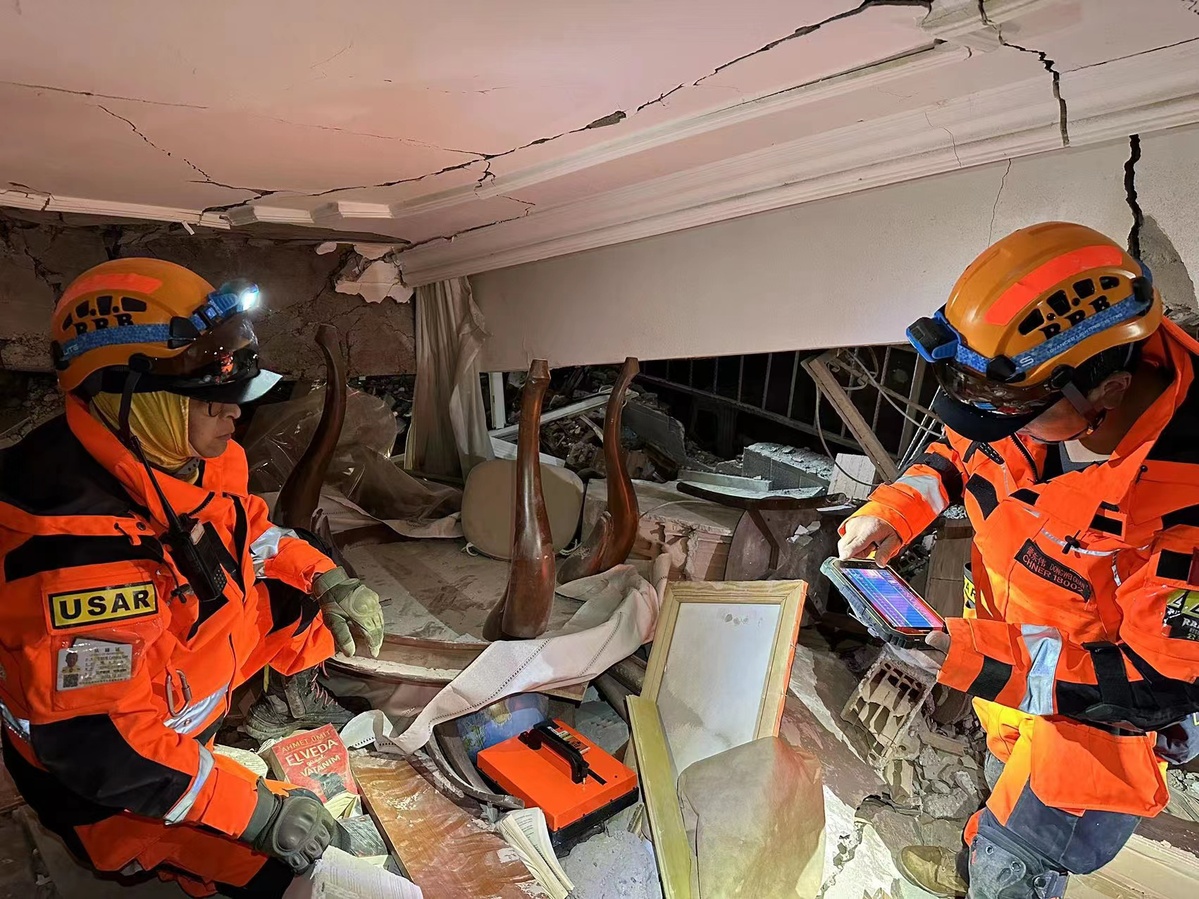
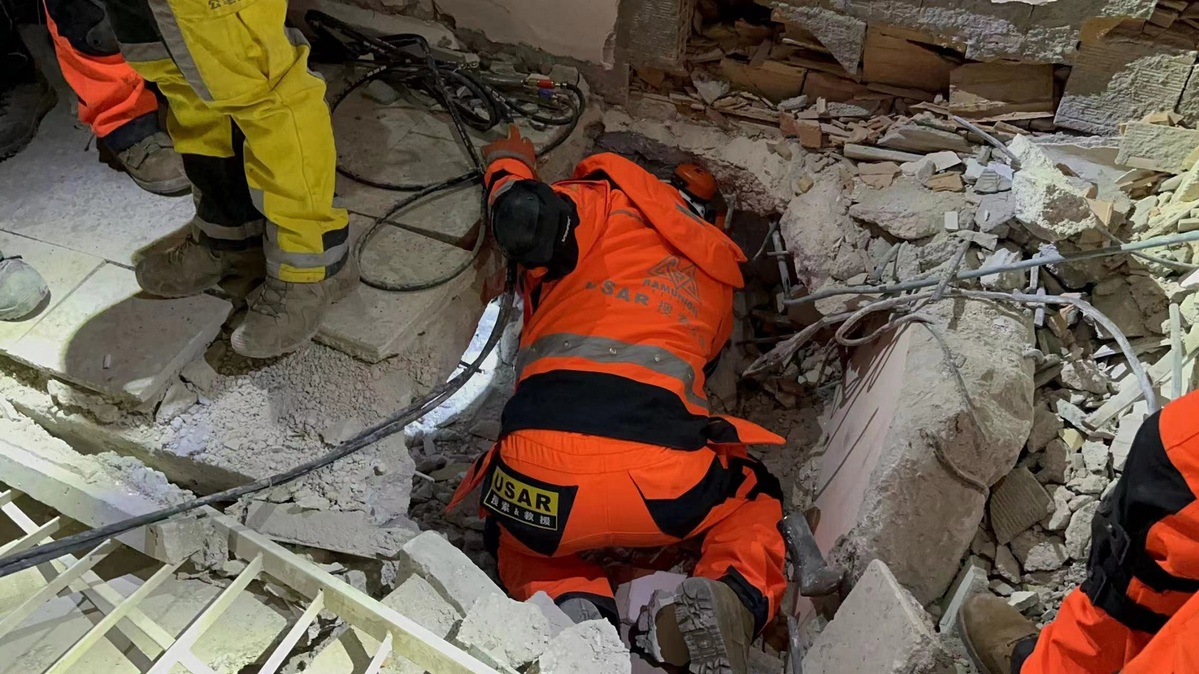


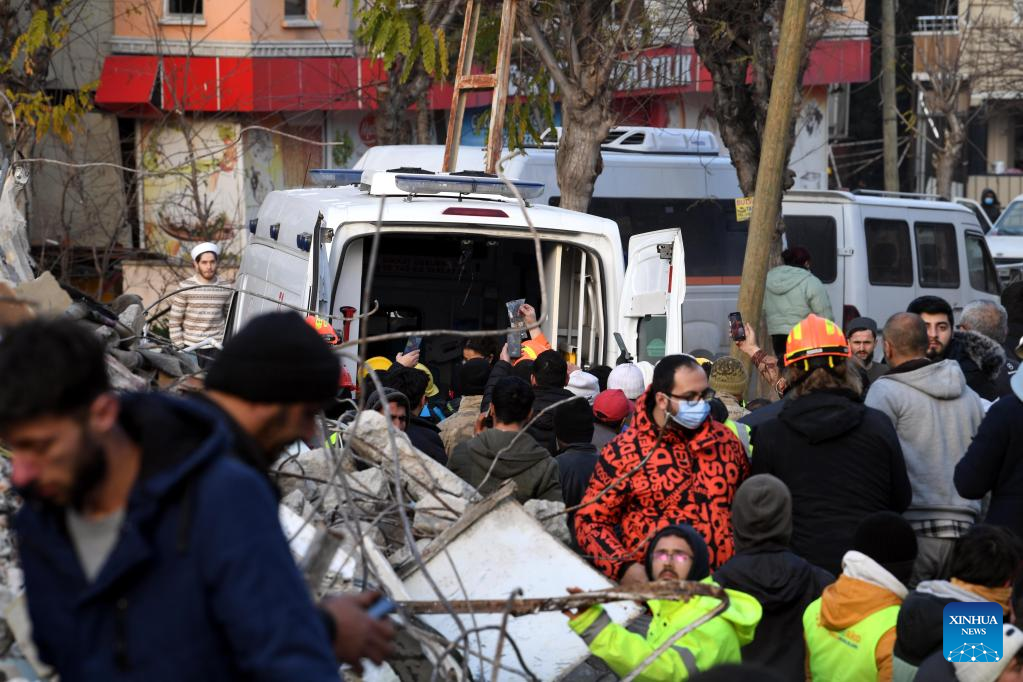
ANKARA -- The death toll from Monday's devastating earthquakes climbed to 20,213 in Turkiye, while another 80,052 injuries were reported in the country, Turkish Health Minister Fahrettin Koca announced late Friday.
Turkiye's southern province of Hatay has the most casualties, with 6,205 people dead and 17,823 others injured, Koca noted.
"After the emergency response, 20,000 of our citizens rescued from the rubble were transferred to provinces outside the region by air, land ambulances, and sea vehicles," he told reporters in Hatay.
Digital photos of patients, whose identities are yet to be identified, have been uploaded to special software for matching, he said.
A magnitude 7.7 earthquake struck Turkiye's southern province of Kahramanmaras at 4:17 am local time (0117 GMT) on Monday, followed by a magnitude 6.4 quake a few minutes later in the country's southern province of Gaziantep and a magnitude 7.6 earthquake at 1:24 p.m. local time in Kahramanmaras.
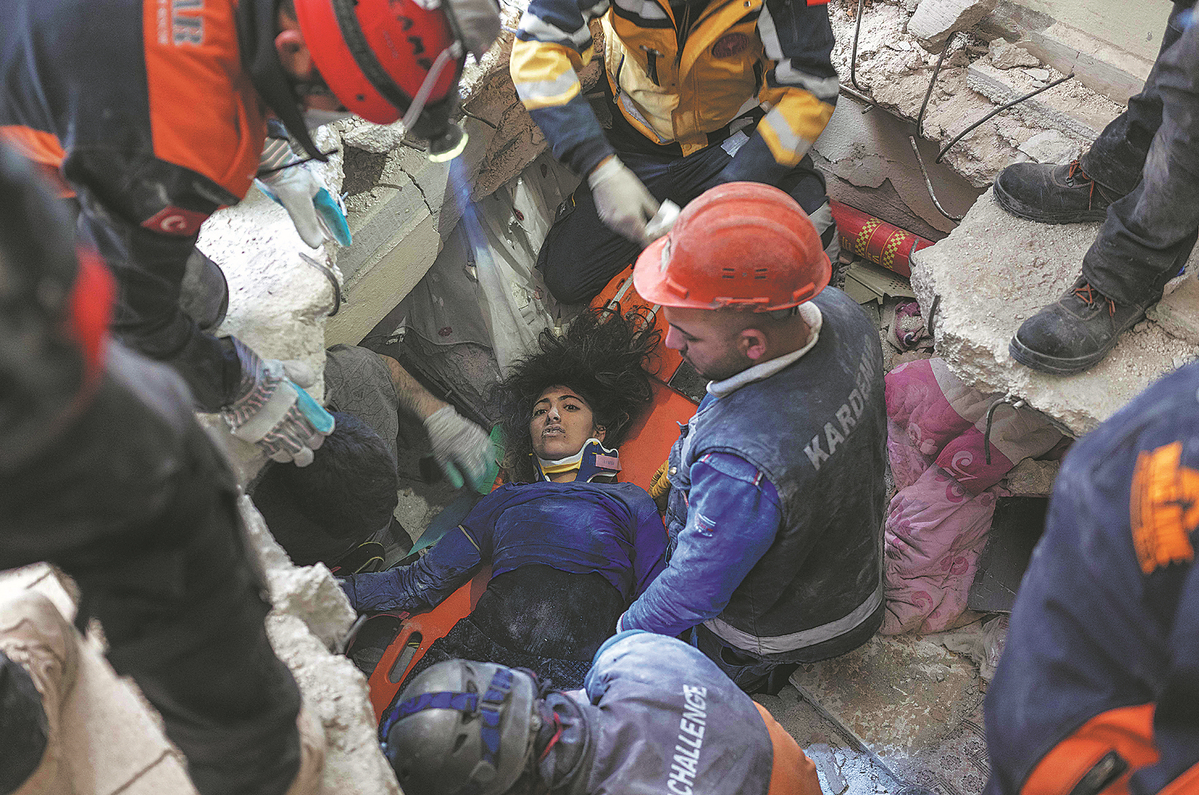
ANTAKYA, Turkiye — It had already been more than the critical 72 hours seen as a cutoff point for finding Turkish earthquake survivors.
But over 80 hours later, 16-year-old Melda Adtas was pulled out alive, leaving her overjoyed father in tears and the grieving nation cheering an agonizingly rare piece of good news after Monday's magnitude-7.8 tremor, which has now left more than 22,000 dead across Turkiye and Syria.
Melda's father felt nothing but relief, as rescuers pulled the teen out of the rubble. "My dear, my dear!" he called out, as the watching crowd broke into applause.
It took rescue workers five painstaking hours to save her life after neighbors raised the alarm.
They had heard sounds from the splintered walls.
For Melda and others in Antakya, a city in one of the most affected provinces, Hatay, the biting cold worsened an already desolate situation.
Hopes rose after rescuers found three people alive in the same building, only a floor above Melda. So the rescuers and her panicked father went looking, determined to find the missing girl.
When rescuers discovered Melda, she was stuck under a wall that had collapsed.
Suleyman, the man leading her rescue effort, is one of a group of Black Sea miners who headed south to help. Without him, the operation could not have been carried out, his co-workers said. He knows his way around dark, narrow spaces.
Working in silence to maintain contact with Melda, the rescuers removed one obstacle after another, as onlookers watched anxiously.
Then all of a sudden, they reached the cold, bruised young girl who was very much alive, and gently brought her to a waiting ambulance.
Several rescuers, wearing helmets, covered in dust and with tired faces, held the stretcher, protecting Melda with a blanket against the cold and prying eyes.
Once Melda was safely in the ambulance, many hugged, kissed and congratulated the rescuers. Several could not hold back tears.
"We haven't worked for nothing, we have pulled a girl from the rubble," one said.
"God bless you all!" her father shouted.
Agencies via Xinhua
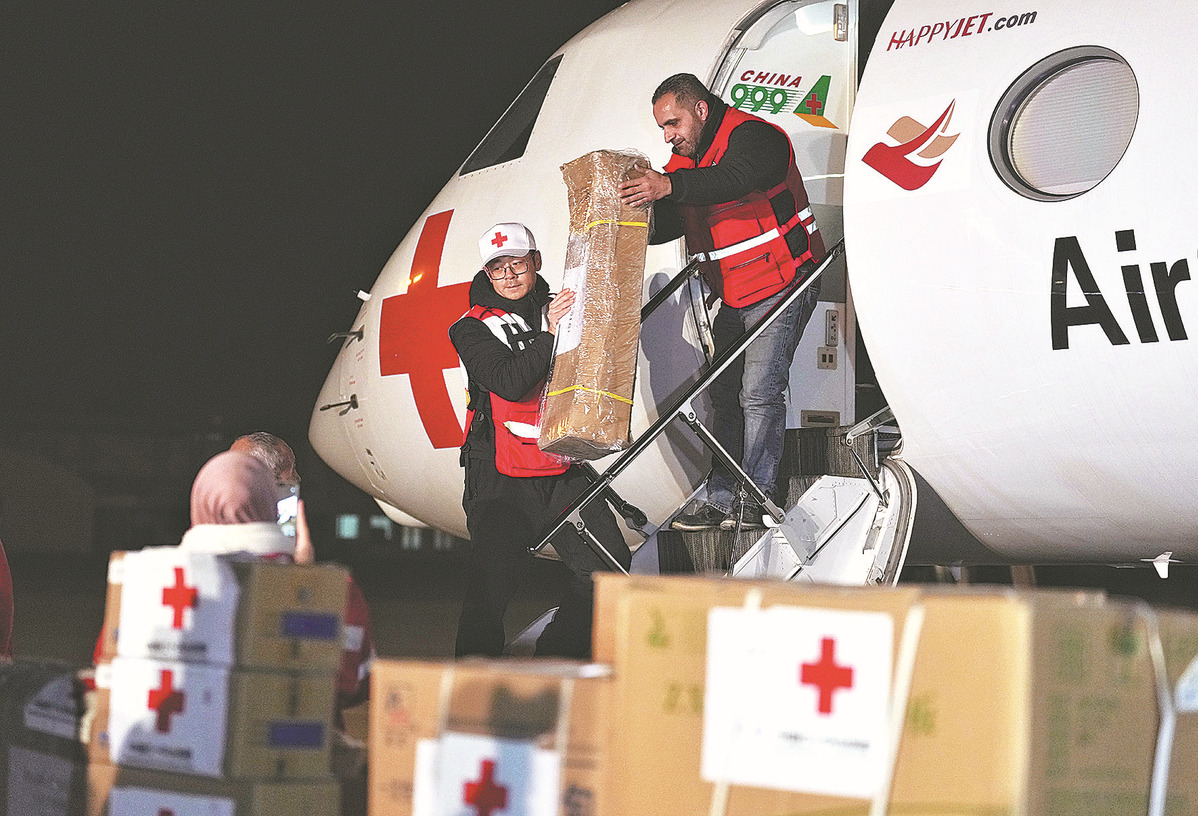
DAMASCUS — Syria's health minister said on Thursday that the Syrian health sector is reeling under pressure from the United States' sanctions, while dozens of nations, including China, have pledged to help.
Hassan al-Ghabbash said the suffering of the Syrian medical sector is not a result of the massive earthquake that hit the country on Monday, but rather the Western sanctions imposed on Syria for 12 years.
Ghabbash stressed that from the first moments of the earthquake, the Syrian Health Ministry's emergency room was mobilized to coordinate the response and send ambulances, mobile clinics, and supply trucks to the most affected provinces.
"We are determined to provide services to Syrian citizens despite all the circumstances and challenges, and the Syrian state has largely succeeded," he said.
Ghabbash added that the shortfall caused by Western sanctions would be made up through the concerted efforts of private sector institutions, trade unions, nongovernmental organizations and civil society.
Assistance in need
The minister called on the UN, the International Committee of the Red Cross and other international organizations to provide assistance to Syria to deal with the disaster.
A decade of civil war in Syria has already destroyed hospitals, collapsed the economy and prompted electricity, fuel and water shortages.
Top aid officials were planning to visit affected areas with World Health Organization head Tedros Adhanom Ghebreyesus and UN humanitarian chief Martin Griffiths both announcing trips.
The president of the International Committee of the Red Cross, Mirjana Spoljaric, traveled to strife-torn Aleppo, Syria.
"Communities struggling after years of fierce fighting are now crippled by the earthquake," Spoljaric said on social media.
"As this tragic event unfolds, people's desperate plight must be addressed."
On Thursday, a plane carrying rescuers with the Red Cross Society of China and its first batch of quake relief aid arrived in Syria's capital Damascus.
Xinhua—Agencies
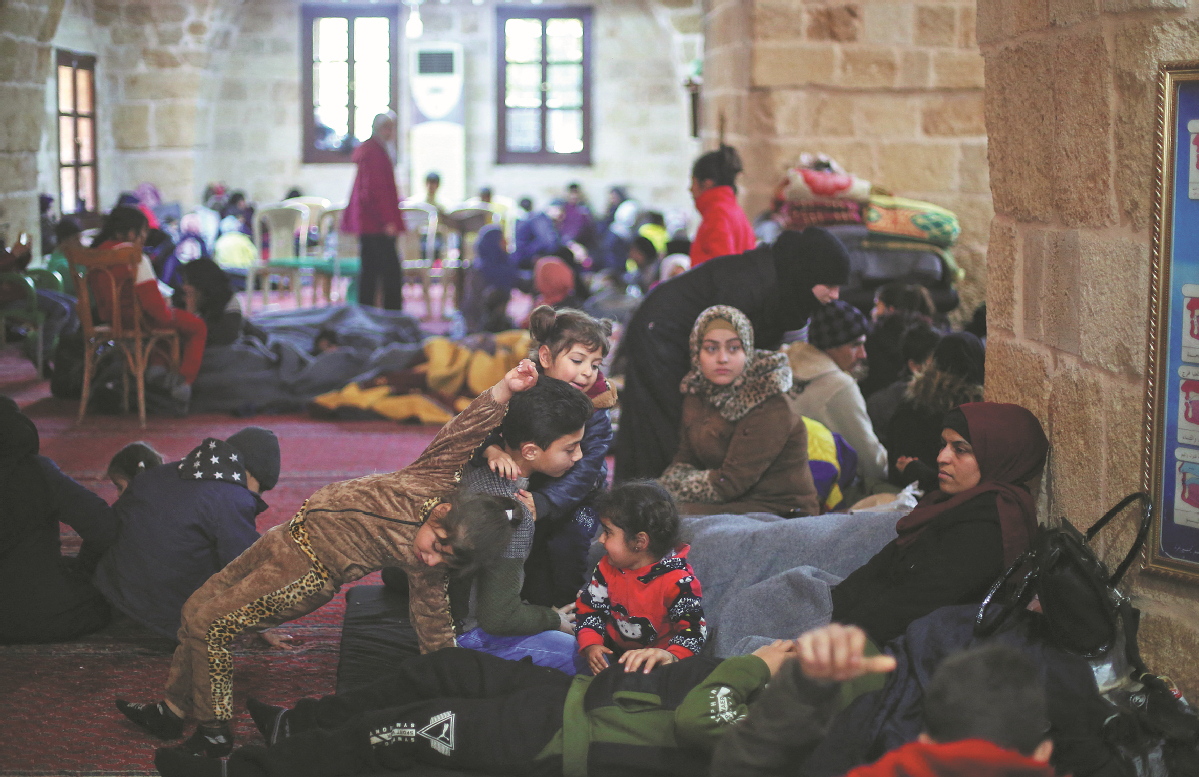
Bitter cold hampers efforts but miracles still happen
BAB AL-HAWA BORDER CROSSING, Syria — Rescuers were scouring debris on Friday nearly 100 hours after a massive earthquake hit Turkiye and Syria, killing at least 22,000 people in one of the region's worst disasters in a century.
Chances of finding survivors have dimmed since the passing of the three-day mark that experts consider a critical period to save lives.
Bitter cold hampered search efforts in both countries, but 104 hours after the disaster struck, 40-year-old Zeynep Kahraman was found alive from the rubble of a collapsed building in Turkiye where she had been trapped since the temblor struck on Monday.
German emergency workers carefully lifted the woman on a stretcher past shattered blocks of concrete and twisted metal in the town of Kirikhan into an ambulance.
"Now I believe in miracles," said Steven Bayer, the leader of the International Search and Rescue team.
Before dawn in Gaziantep, near the epicenter of the quake in Turkiye, rescuers pulled Adnan Muhammed Korkut from the basement where he had been trapped since Monday. The 17-year-old beamed a smile at the crowd of friends and relatives who chanted "Adnan", "Adnan", clapping and crying tears of joy as he was carried out and put onto a stretcher.
"Thank God you arrived," he said, embracing his mother and others who leaned down to kiss and hug him as he was being loaded into an ambulance. "Thank you everyone."
Trapped for 94 hours, but not crushed, the teenager said he had been forced to drink his own urine to slake his thirst.
"I was able to survive that way," he said.
Unstable structures
The magnitude-7.8 quake struck as people slept, in a region where many had already suffered loss and displacement due to Syria's civil war.
Even though experts say trapped people could survive for a week or more, the chances of finding survivors in the freezing temperatures are dimming. As emergency crews and panicked relatives dug through the rubble — and occasionally found people alive — the focus began to shift to demolishing dangerously unstable structures.
Temperatures in the Turkish city of Gaziantep plunged to — 3 C early on Friday.
Despite the cold, thousands of families had to spend the night in cars and makeshift tents — too scared or banned from returning to their homes.
Parents walked the streets of the city carrying their children in blankets because it was warmer than sitting in a tent.
Gyms, mosques, schools and some stores have opened at night. But beds are scarce and thousands spend the nights in cars with engines running to provide heat.
"I fear for anyone who is trapped under the rubble in this," said Melek Halici, who wrapped her 2-year-old daughter in a blanket as they watched rescuers working into the night.
Monday's quake was the largest Turkiye has seen since 1939, when 33,000 people died in the eastern Erzincan Province. Experts fear the number will continue to rise sharply.
In addition to a staggering human toll, the quake's economic cost appears likely to exceed $2 billion and could reach $4 billion or more, Fitch Ratings said.
Agencies—Xinhua

A research team from Wuhan University in Hubei province is measuring the amount of light picked up by satellites to estimate the scale of damage in earthquake-stricken areas in Turkiye.
The team started the analysis by remote sensing technology on Tuesday, a day after the magnitude 7.8 earthquake struck southeastern Turkiye.
Current results showed that lights at night in Hatay, Kahramanmaras and Adiyaman have plummeted. Among them, more than 90 percent of lights disappeared in Hatay, indicating serious damage to infrastructure.
Li Xi, a professor of remote sensing science from the university, led the team, which collected satellite photos taken after the earthquake by organizations and institutions at home and abroad. They then compared them with pre-earthquake photos.
"A sudden loss of lights in such large areas shows that the power cut has severely affected the economy and daily life there," Li said, adding that analysis is ongoing.
On Thursday, a Wuhan University satellite took an image with a resolution of 20 meters, and Li's team is waiting for the satellite to transmit data.
Li said that they have come across some difficulties when shooting photos with optical satellites due to rainy and snowy weather in the disaster-hit areas. The three major cities experienced less cloudy and rainy weather, so they were able to get results.
"It was generally believed that the closer to the epicenter, the greater the damage. However, differences in regions' disaster response capabilities should be taken into account. Through the change of lighting, we can see how heavy the damage is and calculate cities' disaster response abilities. That helps decision-makers take more accurate relief measures," Li said.
Li has informed the United Nations Satellite Center and the World Food Programme of their results to aid the organizations in making disaster-relief policies.
Following the earthquake, the UNSAT activated emergency mapping services and invited Li's team into the project.
Li's team has been engaged in the mapping services since 2017 to assess the impact of disasters by remote sensing for humanitarian purposes.
